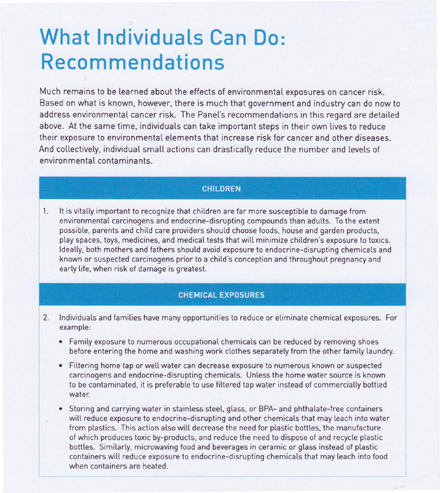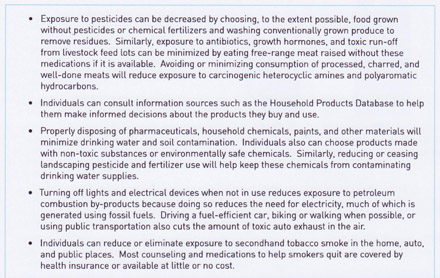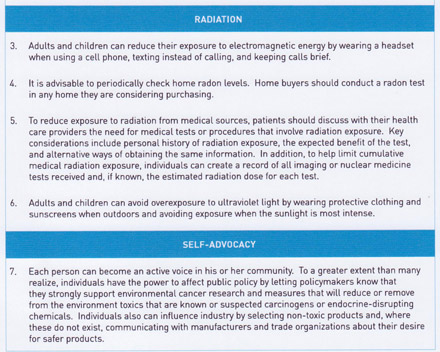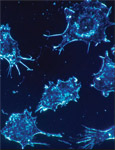Navigation
President's Cancer Panel Releases Report: Reducing Environmental Cancer Risk: What We Can Do Now
The President' Cancer Panel Executive Summary states that "Despite overall decreases in incidence and mortality, cancer continues to shatter and steal the lives of Americans.

The President' Cancer Panel Executive Summary states that "Despite overall decreases in incidence and mortality, cancer continues to shatter and steal the lives of Americans.
 Approximately 41 percent of Americans will be diagnosed with cancer at some point in their lives, and about 21 percent will die from cancer. The incidence of some cancers, including some of the most common among children, is increasing for unexplained reasons."
Approximately 41 percent of Americans will be diagnosed with cancer at some point in their lives, and about 21 percent will die from cancer. The incidence of some cancers, including some of the most common among children, is increasing for unexplained reasons."
The report discusses the key issues for reducing environmental cancer risk and sources and types of environmental contaminants, and calls for action to reduce environmental cancer risk along with recommendations for "eliminating or minimizing cancer-causing and cancer-promoting environmental exposures..." to protect all Americans, especially children.
The following text is from the Report:



 Microscopic image of a cell. From the President's Cancer Panel Report In the conclusion, the report states that "We Need to Determine the Full Extent of Environmental Influences on Cancer and that "The Nation Needs a Comprehensive, Cohesive Policy Agenda Regarding Environmental Contaminants and Protection of Human Health. It calls particular attention to protecting children who are at "special risk due to their smaller body mass and rapid physical development, both of which magnify their vulnerability to known or suspected carcinogens, including radiation. Numerous environmental contaminants can cross the placental barrier; to a disturbing extent, babies are born 'pre-polluted.' Children can also be harmed by genetic or other damage sustained by the mother (and in some cases, the father). There is critical lack of knowledge and appreciation of environmental threats to children's health and a severe shortage of researchers and clinicians trained in children's environmental health."
Microscopic image of a cell. From the President's Cancer Panel Report In the conclusion, the report states that "We Need to Determine the Full Extent of Environmental Influences on Cancer and that "The Nation Needs a Comprehensive, Cohesive Policy Agenda Regarding Environmental Contaminants and Protection of Human Health. It calls particular attention to protecting children who are at "special risk due to their smaller body mass and rapid physical development, both of which magnify their vulnerability to known or suspected carcinogens, including radiation. Numerous environmental contaminants can cross the placental barrier; to a disturbing extent, babies are born 'pre-polluted.' Children can also be harmed by genetic or other damage sustained by the mother (and in some cases, the father). There is critical lack of knowledge and appreciation of environmental threats to children's health and a severe shortage of researchers and clinicians trained in children's environmental health."
 The report, published online on Thursday, May 6, 2010, concludes that "Continued Epidemiologic and Other Environmental Cancer Research is Needed" and offers suggestions for action.
The report, published online on Thursday, May 6, 2010, concludes that "Continued Epidemiologic and Other Environmental Cancer Research is Needed" and offers suggestions for action.
On Friday, May 7, 2010, The New York Times noted the concern of the American Cancer Society, as expressed in a Times interview with Dr. Michael Thun, an epidemiologist from the cancer society, that attention to environmental concerns might "divert attention from things that are bigger causes of cancer, like smoking...."
Search
Latest articles
Agriculture
- World Water Week: Healthy ecosystems essential to human health: from coronavirus to malnutrition Online session Wednesday 24 August 17:00-18:20
- World Water Week: Healthy ecosystems essential to human health: from coronavirus to malnutrition Online session Wednesday 24 August 17:00-18:20
Air Pollution
- "Water and Sanitation-Related Diseases and the Changing Environment: Challenges, Interventions, and Preventive Measures" Volume 2 Is Now Available
- Global Innovation Exchange Co-Created by Horizon International, USAID, Bill and Melinda Gates Foundation and Others
Biodiversity
- It is time for international mobilization against climate change
- World Water Week: Healthy ecosystems essential to human health: from coronavirus to malnutrition Online session Wednesday 24 August 17:00-18:20
Desertification
- World Water Week: Healthy ecosystems essential to human health: from coronavirus to malnutrition Online session Wednesday 24 August 17:00-18:20
- UN Food Systems Summit Receives Over 1,200 Ideas to Help Meet Sustainable Development Goals
Endangered Species
- Mangrove Action Project Collaborates to Restore and Preserve Mangrove Ecosystems
- Coral Research in Palau offers a “Glimmer of Hope”
Energy
- Global Innovation Exchange Co-Created by Horizon International, USAID, Bill and Melinda Gates Foundation and Others
- Wildlife Preservation in Southeast Nova Scotia
Exhibits
- Global Innovation Exchange Co-Created by Horizon International, USAID, Bill and Melinda Gates Foundation and Others
- Coral Reefs
Forests
- NASA Satellites Reveal Major Shifts in Global Freshwater Updated June 2020
- Global Innovation Exchange Co-Created by Horizon International, USAID, Bill and Melinda Gates Foundation and Others
Global Climate Change
- It is time for international mobilization against climate change
- It is time for international mobilization against climate change
Global Health
- World Water Week: Healthy ecosystems essential to human health: from coronavirus to malnutrition Online session Wednesday 24 August 17:00-18:20
- More than 400 schoolgirls, family and teachers rescued from Afghanistan by small coalition
Industry
- "Water and Sanitation-Related Diseases and the Changing Environment: Challenges, Interventions, and Preventive Measures" Volume 2 Is Now Available
- Global Innovation Exchange Co-Created by Horizon International, USAID, Bill and Melinda Gates Foundation and Others
Natural Disaster Relief
- STOP ATTACKS ON HEALTH CARE IN UKRAINE
- Global Innovation Exchange Co-Created by Horizon International, USAID, Bill and Melinda Gates Foundation and Others
News and Special Reports
- World Water Week: Healthy ecosystems essential to human health: from coronavirus to malnutrition Online session Wednesday 24 August 17:00-18:20
- STOP ATTACKS ON HEALTH CARE IN UKRAINE
Oceans, Coral Reefs
- World Water Week: Healthy ecosystems essential to human health: from coronavirus to malnutrition Online session Wednesday 24 August 17:00-18:20
- Mangrove Action Project Collaborates to Restore and Preserve Mangrove Ecosystems
Pollution
- Zakaria Ouedraogo of Burkina Faso Produces Film “Nzoue Fiyen: Water Not Drinkable”
- "Water and Sanitation-Related Diseases and the Changing Environment: Challenges, Interventions, and Preventive Measures" Volume 2 Is Now Available
Population
- "Water and Sanitation-Related Diseases and the Changing Environment: Challenges, Interventions, and Preventive Measures" Volume 2 Is Now Available
- "Water and Sanitation-Related Diseases and the Changing Environment: Challenges, Interventions, and Preventive Measures" Volume 2 Is Now Available
Public Health
- Honouring the visionary behind India’s sanitation revolution
- Honouring the visionary behind India’s sanitation revolution
Rivers
- World Water Week: Healthy ecosystems essential to human health: from coronavirus to malnutrition Online session Wednesday 24 August 17:00-18:20
- Mangrove Action Project Collaborates to Restore and Preserve Mangrove Ecosystems
Sanitation
- Honouring the visionary behind India’s sanitation revolution
- Honouring the visionary behind India’s sanitation revolution
Toxic Chemicals
- "Water and Sanitation-Related Diseases and the Changing Environment: Challenges, Interventions, and Preventive Measures" Volume 2 Is Now Available
- Actions to Prevent Polluted Drinking Water in the United States
Transportation
- "Water and Sanitation-Related Diseases and the Changing Environment: Challenges, Interventions, and Preventive Measures" Volume 2 Is Now Available
- Urbanization Provides Opportunities for Transition to a Green Economy, Says New Report
Waste Management
- Honouring the visionary behind India’s sanitation revolution
- Honouring the visionary behind India’s sanitation revolution
Water
- Honouring the visionary behind India’s sanitation revolution
- Honouring the visionary behind India’s sanitation revolution
Water and Sanitation
- Honouring the visionary behind India’s sanitation revolution
- Honouring the visionary behind India’s sanitation revolution

